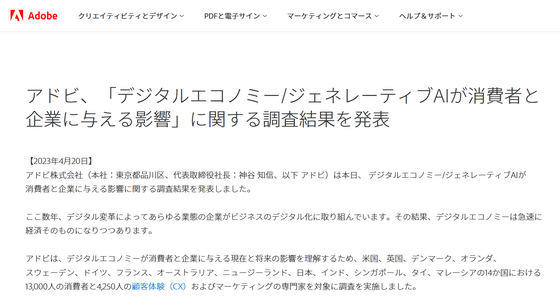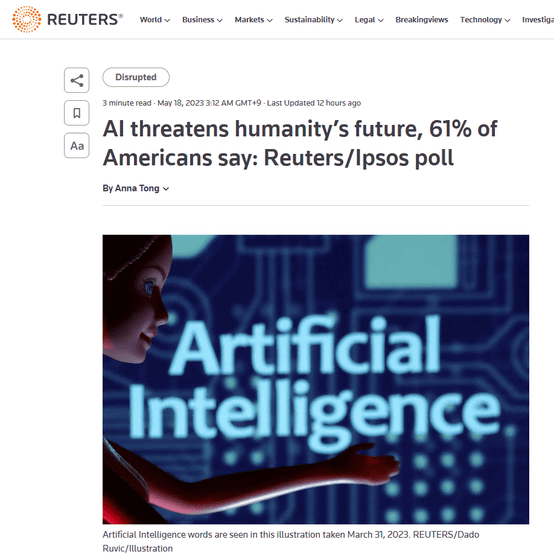75% of Japanese say AI is 'useful' while 2% evaluate it as 'evil incarnate', and in another survey in the United States, 61% believe that AI may threaten humanity, more than 66% concerned about negative impact

The development of generative AI that can automatically generate images and sentences, such as image generation AI such as
Adobe Unveils Study Results on “Impact of Digital Economy/Generative AI on Consumers and Businesses”
https://www.adobe.com/jp/news-room/news/202304/20230420_adobe-digital-economy-survey.html

The survey was conducted in 14 countries: USA, UK, Denmark, Netherlands, Sweden, Germany, France, Australia, New Zealand, Japan, India, Singapore, Thailand and Malaysia. The survey was conducted with 4,250 marketing professionals.
In response to the question ``Do you think generative AI will improve the customer experience?'', 76% of Japanese consumers answered, ``I think generative AI will improve the customer experience.'' On the other hand, 67% of American consumers answered that they 'think it will improve.'

Furthermore, in response to the question, 'Which description do you think is the most appropriate for explaining generative AI?', 73% of Japanese consumers answered 'useful' and 3% answered 'miracle.' about three-quarters of respondents gave positive responses. In addition, 9% answered 'unnecessary', 5% 'annoying', 2% 'evil incarnate', and 9% 'irrelevant to me'. On the other hand, in the United States, 43% answered that it was 'useful', 3% answered that it was 'miracle', and 46% of consumers who answered positively. 7% answered 'annoying', 10% 'unnecessary', 4% 'evil incarnate', and the remaining 32% answered 'irrelevant to me'.

Also, when we asked CX and marketing experts, 'Do you actively use content created with generative AI?' was 31%. In Japan, not only 16% of the respondents answered that they 'absolutely do not use', but also those who answered 'only if used by other major companies' and 'only if authorized by legal counsel'. totaled 46%, indicating a cautious attitude toward the use of generative AI. On the other hand, 64% of Americans answered that they would 'proactively use', more than twice as many as in Japan.

In addition, a joint survey of 4,415 American adults by news media Reuters and market research firm Ipsos found that more than two-thirds were concerned about the adverse effects of AI.
AI threatens humanity's future, 61% of Americans say: Reuters/Ipsos poll | Reuters
https://www.reuters.com/technology/ai-threatens-humanitys-future-61-americans-say-reutersipsos-2023-05-17/

61% of respondents said ``AI poses a risk to humanity,'' 22% said ``I don't think AI poses a risk,'' and 17% said ``I'm still not sure.'' Furthermore, 70% of those who voted for Republican Donald Trump in the 2020 presidential election answered that AI poses a risk to humanity, while those who voted for Joe Biden said that AI 60% said they pose a risk to humanity.
Professor Ion Stoika, a researcher at the University of California, Berkeley and founder of the AI company Anyscale , said, ``The application of AI, which shows revolutionary success in pharmaceuticals and other fields, is as invisible as ChatGPT. , they probably don't realize how pervasive AI is already in their daily lives, both at home and at work.'
Related Posts:







